As Far Away as Mars
After a short break and some time to process his experience in Antarctica, we caught up with Inspiring Explorer Anzac Gallate to get his perspective on the expedition, and find out about the highlights of his trip, and the big challenges he faced.
About Anzac
Anzac is studying towards a Bachelor’s degree in Geography and Environmental Science at the University of Canterbury. He is deeply passionate about the environment and has led a group of students in developing an environmental education programme called The Gro•Up Group, which utilises augmented reality and virtual reality to engage primary school students. This project received support from the University of Canterbury Centre for Entrepreneurship Summer Start-Up programme, and the ‘Dream. Believe. Succeed. Foundation’. The group won the Change-Maker Award at the University of Canterbury Centre for Entrepreneurship’s (UCE) Showcase in February. While at high school, Anzac was part of a Sustainability Council working group which won the Zayed Future Energy Prize, a prestigious global sustainability award. Following the award, Anzac travelled to the UAE to present at the Abu Dhabi Sustainability Week. Anzac is enthusiastic about outdoor pursuits, particularly surfing, white-water kayaking, skiing and rock climbing.
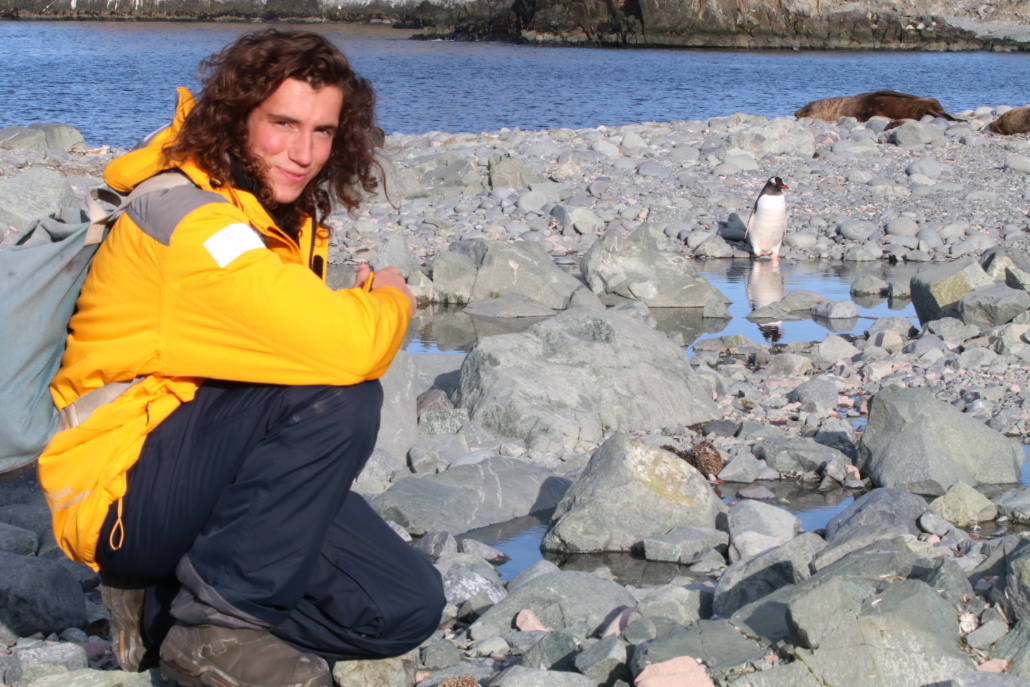 Marcus Waters/Antarctic Heritage Trust
Marcus Waters/Antarctic Heritage Trust Anzac appreciating the wildlife
What was your favourite part of the trip?
We were able to connect with the environment in such a special way from our kayaks. We were in the elements freezing our butts off, with the wind and water on our faces. In the kayaks, seals would come right up to us and pop their heads above the water to give us an inquisitive stare.
On one excursion, we were sitting still in our kayaks among the brash ice when a Minke whale came up to the group. It would surface with a loud snort and then disappear back down into the dark blue water, before surfacing again. We would be left with these very intense moments of suspense, almost verging on terror – not knowing when or where it would surface again.
My favourite excursion was a dusk paddle. The light almost seemed unnatural, a flat grey, and it really gave a sense of being in an alien environment. We paddled on the glassy water in absolute silence. On that excursion we didn’t see any animals either, we were the only moving pieces which added to the other-other-worldly feeling.
What was the most challenging part? How did you conquer this?
The days were really jam packed, so the biggest challenge for us was making sure we all stayed on top of everything, took care of ourselves and kept our energy levels up. I took a few cheeky naps where I could.
What did you learn or discover about yourself?
I felt I really connected with my passion for exploration, and further realised how important it is for me to incorporate exploration into my life – even day-to-day. The trip certainly has left me plotting and scheming as to what the next adventure might be! I really enjoy working in teams, and find those environments to be where I learn a lot about myself, but also about leadership. The dynamic of the expedition team was definitely very interesting to be a part of with all the different backgrounds.
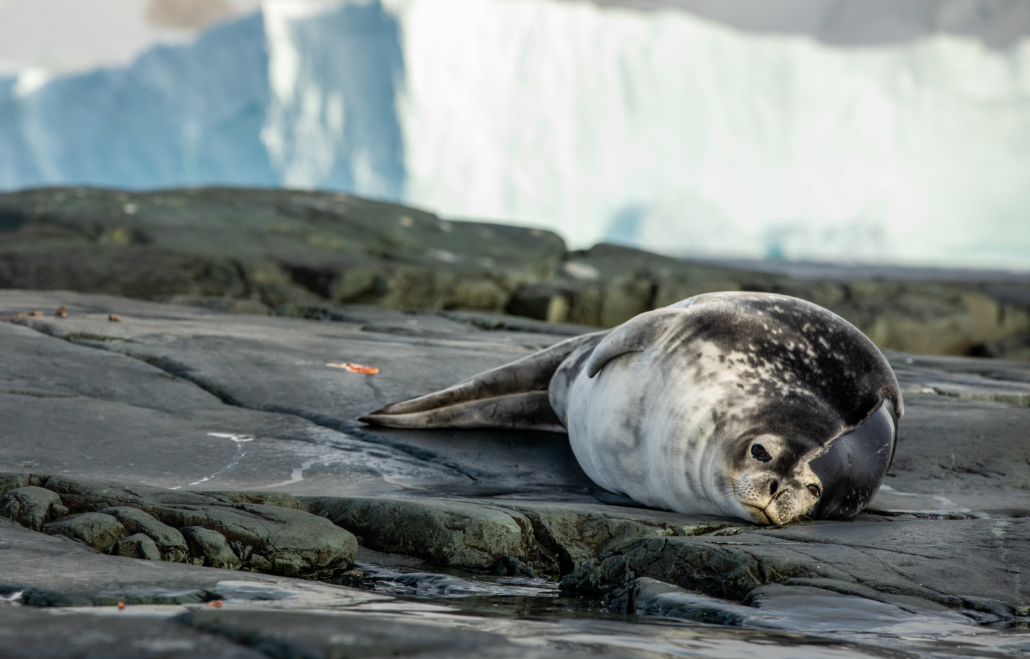 Mike Dawson/Antarctic Heritage Trust
Mike Dawson/Antarctic Heritage Trust One of the locals
Which sights, sounds, feelings and experiences of Antarctica stand out as you reflect back on your experience?
The scale of Antarctica is really difficult to comprehend. You can read about it being twice the size of Australia but it’s hard to really understand what that looks like. We got to look out over these sweeping, towering, panoramic landscapes and compare what we saw to the charts to see it was all one tiny island compared to the rest of the peninsula, not to mention mainland Antarctica. It was incredible to gain that perspective.
We had some pretty surreal animal encounters. Seals popped up, and swam underneath our kayaks, penguins played in the water and on the beach, and whales circled around us. I was surprised at how loud the whales were – when they surface for air, the sound carries across the water almost like a gunshot.
How did going to Antarctica make you think about the historic polar explorers? In what way did these reflections impact on your personal experience?
As we were sat on our ship with its hot water, air conditioning, and buffet meals I definitely reflected on how tough and gruelling it must have been for the historic explorers in such an extreme environment without any of these luxuries. During the trip we learnt a lot about the historic explorers’ different motives and reasons for seeking out this experience into the unknown, despite the dangers and uncertainty that came with that. I think to experience the energy, passion, and drive those men had would have been incredible to witness. It left me thinking about what that would look like today, in facing today’s issues. It certainly made me reflect on my own motivations and interests around Antarctica and the environment.
I really enjoyed hearing more about our Expedition Leader, Marcus Waters’ own kayaking adventure in Antarctica. Being able to ask him questions, and also talk to the kayak guides about their experiences was wicked.
What was something you experienced that was different to your expectations?
I think as New Zealanders, we see a different Antarctica to the landscapes of the peninsula. We see our slice. I don’t think many of us were expecting the towering mountains and rock faces that we got to experience.
I was also amazed at how abundant the wildlife was. I didn’t expect to see so many different animals, which were everywhere we went.
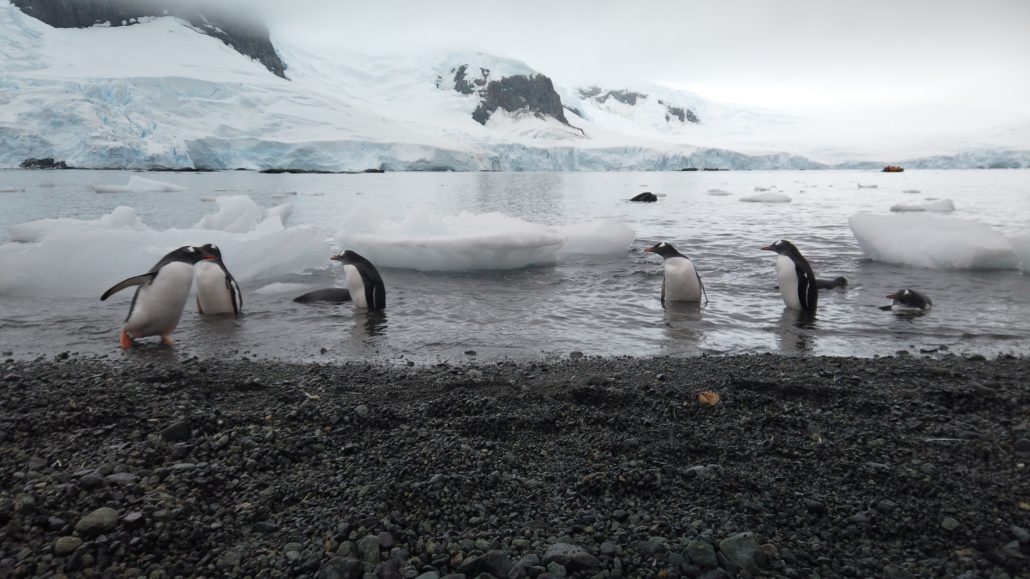 Anzac Gallate/Antarctic Heritage Trust
Anzac Gallate/Antarctic Heritage Trust Penguins playing
When you share your story, what will be the things you want to share most?
Trying to describe and capture how alien, unique, special and vast this incredible place is at the bottom of t
he world. Our guides hit the nail on the head when they said it can be tough to go home and try to communicate exactly what we’ve experienced. I know this will be an interesting challenge, but I hope my augmented reality* (AR) and virtual reality (VR) content will give people a first-person experience of what it’s like, and hopefully allow them a more in-depth interaction with the landscape and wildlife.
*VR replaces reality, taking you somewhere else. AR adds to reality, projecting information on top of what you’re already seeing. These technologies are accessed by headsets and devices like mobile phones and tablets.
What other messages will you be giving to audiences about the trip?
Going down to Antarctica and seeing the environment with ice at its foundation really hammered home the impacts of climate change. The entire ecosystem rests on the keystone species of Krill – which depends on algae which grows on the underside of the sea ice. Like any ecosystem, it’s delicately balanced. Additionally, the presence of that ice is responsible for the world’s ocean currents and weather systems. To many people, Antarctica can seem about as distant as Mars, but ultimately we all depend on it staying the way it is.
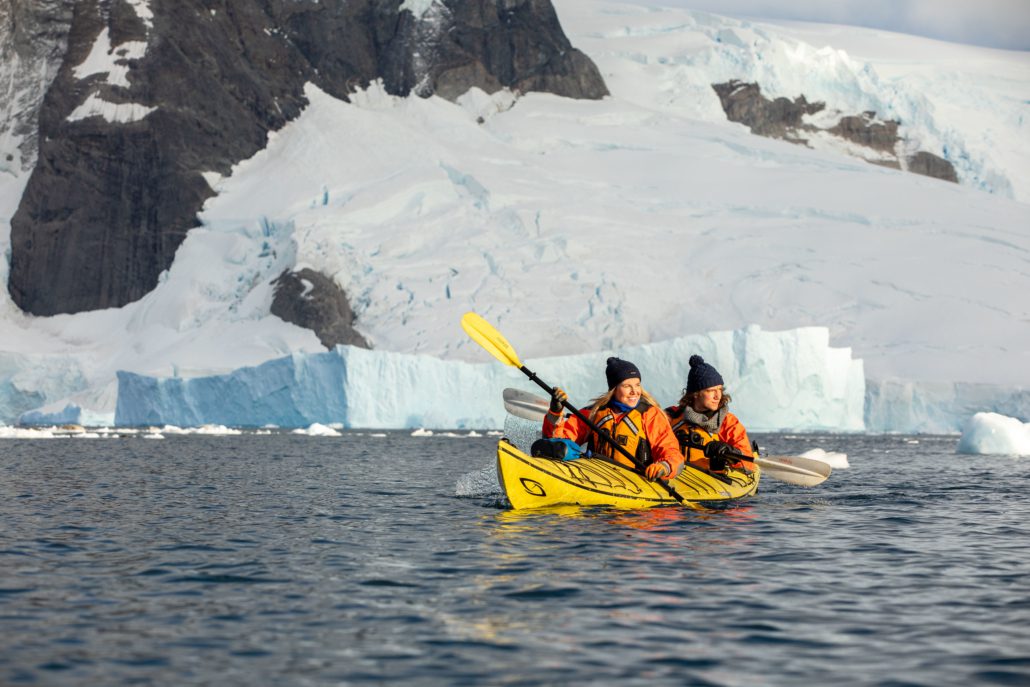 Mike Dawson/Antarctic Heritage Trust
Mike Dawson/Antarctic Heritage Trust Laurette and Anzac kayaking
What skills did you bring to the team, and how were you able to utilise these on the trip?
Utilising my photography and videography skills and making sure I captured the collection of specific content was a focus. I also tried to contribute to the positive spirit and morale of the team and engaging with them through humour.
Any comments about the team itself? What were the strengths of the team? Why do you think it worked well together?
We all connected really well right from Team Building Weekend and reflected that the fact we came from diverse backgrounds was also a strength. The haka led by A’aifou and Jaylee on board the ship while we were in isolation was a great experience for the team and really allowed us to bond further. We all put our best foot forward to learn it and nail it.
How did you and the team deal with the disruption to your trip caused by COVID-19? Did this experience make you reflect on the challenges faced by the historic explorers? What similarities do you think there might be?
The team’s response was awesome. We all stayed incredibly positive and tight while we were stuck on the ship for a week-and-a-half and marvelled at the ridiculous situation we found ourselves in – trapped at the bottom of the world in a global pandemic. This experience made me realise how incredibly important morale and maintaining a positive team attitude is for an expedition, which may not always go according to plan. As I reflected on the historic explorers who may have spent months or even years trapped on the ice, I think they must have had incredible resilience, morale, and also creativity to keep themselves going.
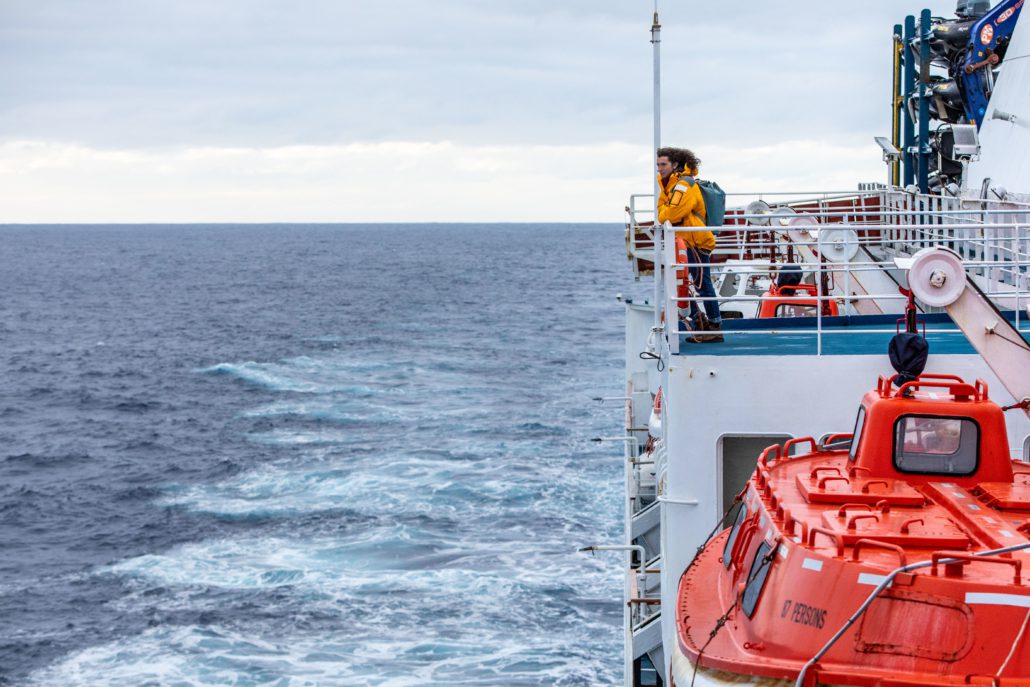 Mike Dawson/Antarctic Heritage Trust
Mike Dawson/Antarctic Heritage Trust Anzac aboard the Ocean Endeavour
Would you recommend others apply for future expeditions and why?
Absolutely! When I saw the application, I couldn’t believe what an incredible opportunity it was. The whole experience is certainly very perspective-changing (not to mention a whole lot of fun). The whole time we were just in absolute awe and wonder at what we were experiencing.
I think it’s important that potential applicants don’t be put off by the criteria. There are always skills you can develop, around things like delivering an engagement programme, and the Trust provides heaps of support.
Do you have any advice for future expedition members?
You most likely won’t get time to do all the things you planned, so be clear on some experiences or things you really want to do and make time to do them, as it’s amazing how fast the trip goes. For me, this included simply standing on the observation deck in the snow and listening to some music I had prepared – looking out at the incredible landscape and reflecting.
Don’t spend all of your time behind the camera, remember to experience the moment!
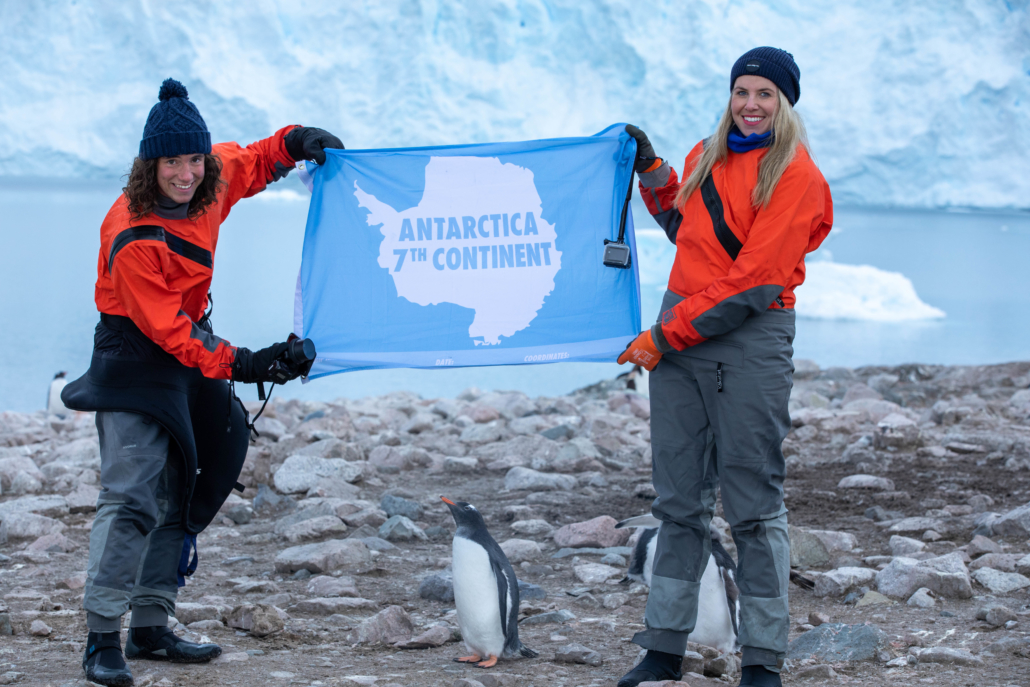 Mike Dawson/Antarctic Heritage Trust
Mike Dawson/Antarctic Heritage Trust Anzac and Laurette on the seventh continent


